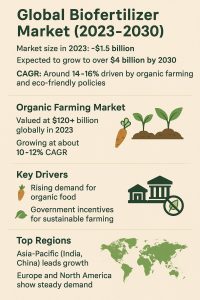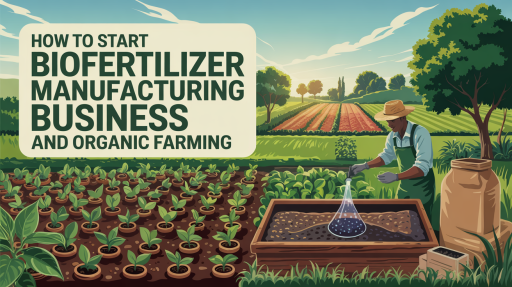Sustainable agriculture practices are growing today in an eco-conscious world. Biofertilizer manufacturing business and organic farming business ideas are very promising entrepreneurial ideas. This article seeks to discuss how you can set up biofertilizer production activity and establish an organic farming strategy for success.
Understanding Biofertilizers
Biofertilizers are eco-friendly substitutes to chemical fertilizers, consisting of living organisms that add to the soil all the essential nutrients. These organisms fix atmospheric nitrogen, decompose organic matter, and create good conditions for soil fertility, thus promoting the healthy growth of a plant.
Why Invest in Biofertilizers?
- Increasing demand for organic produce.
- Solutions for cost-effective and sustainable farming.
- Environmentally friendly and nontoxic to the environment.
Starting a biofertilizer manufacturing business will, therefore, not only support sustainable farming but also open up opportunities for a lucrative business.
Why Choose Biofertilizers and Organic Farming?
- Eco-Friendly Solution: Biofertilizers reduce chemical fertilizer dependency which is harmful to the environment.
- Cost-effective: They are affordable for farmers in comparison to synthetic fertilizers.
- Improves Soil Health: Biofertilizers make soil more fertile and enhance soil structure.
- Market Demand: The world organic farming market is growing at a fast pace creating opportunities for biofertilizer manufacturers.
Related Article: Organic Farming and Biofertilizer Production
Global Biofertilizer Market (2023-2030)

Market size in 2023: ~$1.5 billion
Expected to grow to over $4 billion by 2030
CAGR: Around 14–16% driven by organic farming and eco-friendly policies
Organic Farming Market:
Valued at $120+ billion globally in 2023
Growing at about 10–12% CAGR
Key Drivers:
Rising demand for organic food
Government incentives for sustainable farming
Environmental concerns are reducing chemical fertilizer use
Top Regions:
Asia-Pacific (India, China) leads growth
Europe and North America show steady demand
Step-by-Step Guide to Start Biofertilizer Production
1. Research the Biofertilizer Manufacturing Process
The first step should be understanding the biofertilizer manufacturing business. It includes:
- Selection of Microorganisms: You should choose microorganisms such as Rhizobium, Azotobacter, or Azospirillum according to your target crops.
- Fermentation: Grow microorganisms in a nutrient-rich medium in sterilized fermentation tanks.
- Carrier Preparation: Use a carrier material like peat or lignite for mixing with the microorganisms to survive.
- Packing: Packaged biofertilizers in moisture-proof bags to maintain efficacy and quality.
Highlight the biofertilizer manufacturing process to ensure the quality and compliance of biofertilizers according to agricultural standards.
2. Obtain Necessary Licenses and Certifications
So, let’s talk about the biofertilizer production business start-up. While starting up a biofertilizer production business, the first step is to comply with local laws and obtain licenses:
- Certification under the Fertilizer Control Order (FCO).
- Clearance from the pollution control board.
- Business registration and GST number.
In this manner, the certification shall provide credibility to the business, and confidence will be built among customers regarding product quality.
3. Set Up the Manufacturing Unit
Choose a specific site for the biofertilizer plant. It has to cover:
- Adequate space for fermentation tanks and storage.
- Access to water and electricity.
- Proper waste disposal.
Make investments in the essential equipment, including autoclaves, fermenters, and packaging machines, that will help in improving the whole process of biofertilizer manufacture.
4. Source Raw Materials
Important raw materials are:
- Specific strains of microorganisms.
- Carrier materials, such as charcoal or peat.
- Substrates rich in nutrients.
Complete the preparation of raw materials for quality to ensure the production of effective biofertilizers.
5. Market Your Biofertilizer Products
A marketing strategy should be formulated for your products. These are the ones that boast as the advantages of biofertilizers concerning sustaining agricultural practices and organic produce. Digital promotions would include collaborations with agricultural cooperatives and participation in trade fairs as other avenues to reach out to potential customers.
Related Book: Manufacture of Biofertilizer and Organic Farming (2nd Edition)
Organic Farming Business Ideas
Organic farming greatly complements biofertilizer production, and it has much to offer regarding some innovative organic farming business ideas one can work upon:
1. Organic Vegetable Farming
Cultivation of vegetables without chemical fertilizers or pesticides. Use your biofertilizers to increase soil fertility and crop yield.
2. Organic Fruit Orchards
Developing orchards based on organic practices. Major fruits include mangoes, bananas, and apples which have very high demand in the organic market.
3. Organic Herb Cultivation
Basil, mint, and thyme are the commonly available herbs in organic food and wellness markets.
4. Organic Dairy Farming
Combining organic fodder production with dairy farming provides pure organic milk and milk products.
5. Vermicomposting Business
Make organic compost with earthworms-this may also be a product line in your bio-fertilizers production business.
Linking all of these organic farming business ideas offers a holistic view towards sustainable agriculture.
Related Book: The Complete Technology Book on Biofertilizer and Organic Farming
How to Start Organic Farming
Starting an organic farming business involves strategic planning and adherence to organic standards. Follow these steps:
1. Choose the Right Land
Choose a chemical-free land. Also conduct soil tests to prove whether it is suitable for organic farming.
2. Plan Crop Rotation and Companion Planting
Practice crop rotation to maintain soil fertility. Use companion planting techniques to naturally control pests.
3. Use Biofertilizers and Organic Inputs
Incorporate biofertilizers, organic compost, and natural pesticides to enrich the soil and protect crops.
4. Obtain Organic Certification
For selling products in the organic category, you must have certification from the competent authorities.
5. Build a Distribution Network
Collaborate with local markets, organic stores, and e-commerce platforms to sell your produce.
Challenges and Solutions
Challenges:
- High initial investment is needed in setting up bio-fertilizer production units.
- Lack of awareness of the benefits of biofertilizers among farmers.
- Competition among manufacturers of chemical fertilizers.
Solutions:
- Seek government subsidies and grants for eco-friendly businesses.
- Conduct awareness campaigns for farmers and workshops.
- Differentiate the product through the environmental benefits.
Benefits of Combining Biofertilizer Production and Organic Farming
Produce your biofertilizer and practice organic farming to create a business sustainability model. Organic farming requires bio-fertilizers, and Bio-fertilizers increase the crop yield in organic farming. This synergy ensures long-term profitability and environmental sustainability.
Project Report on:- Biofertilizer Manufacturing Business
Conclusion
It is a very good opportunity for a new entrepreneur to start biofertilizer production and venture into organic farming business ideas. One can embody all green with the understanding of the biological pathway for biofertilizers manufacturing process, inculcation of sustainable practices, and educating farmers. One can thus contribute to the future by making a greener place, while at the same time earning a big profit in business.
Watch Youtube Video :- What is Biofertilizer? Benefits, Uses & Business Opportunity
How NPCS Can Help You Start and Grow a Successful Business
Niir Project Consultancy Services (NPCS) is a trusted partner for entrepreneurs, startups, and small business owners across India. With decades of experience, NPCS provides in-depth support to turn innovative ideas into scalable businesses — especially in emerging sectors like agro-waste-based manufacturing, specialty chemicals, home-based businesses, and more.
 Market Research & Techno-Economic Feasibility Reports
Market Research & Techno-Economic Feasibility Reports
NPCS delivers comprehensive market research reports that include:
Industry trends and demand analysis
Legal and regulatory requirements
Raw material sourcing and local supply chain insights
Cost structure and value chain assessment
These reports help you validate your business idea and understand its viability in the real market.
FAQs on Biofertilizer Manufacturing & Organic Farming
1. What are biofertilizers and why are they important?
Biofertilizers are natural fertilizers containing living microorganisms that enhance soil fertility by fixing nitrogen, decomposing organic matter, and improving nutrient availability. They are important because they promote sustainable farming, reduce chemical fertilizer usage, and improve crop yields naturally.
2. How do I start a biofertilizer manufacturing business?
To start a biofertilizer manufacturing business, you need to research the production process, select suitable microorganisms, obtain necessary licenses like Fertilizer Control Order (FCO) certification, set up a manufacturing unit, source quality raw materials, and develop a strong marketing strategy targeting organic farmers and cooperatives.
3. What are the raw materials required for biofertilizer production?
Key raw materials include specific strains of microorganisms (e.g., Rhizobium, Azotobacter, Azospirillum), carrier materials like peat or lignite, and nutrient-rich substrates to support microorganism growth during fermentation.
4. How can biofertilizers benefit organic farming?
Biofertilizers improve soil health, increase nutrient uptake, and boost crop yields without harmful chemicals. They also enhance soil structure, promote beneficial microbial activity, and make organic farming more cost-effective in the long run.
5. What certifications are needed for selling biofertilizers?
In India, biofertilizer manufacturers must comply with the Fertilizer Control Order (FCO) and obtain approvals from the Pollution Control Board. For organic farming produce, obtaining organic certification from accredited agencies is necessary to label and sell products as “organic.”




 Market Research & Techno-Economic Feasibility Reports
Market Research & Techno-Economic Feasibility Reports


